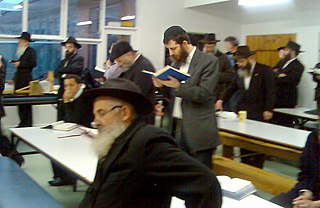Nusach can refer to:
Nusach can refer to:

A siddur is a Jewish prayer book containing a set order of daily prayers. The word siddur comes from the Hebrew root ס־ד־ר, meaning 'order.'
Rite may refer to:
Ashkenaz may refer to:

Selichot are Jewish penitential poems and prayers, especially those said in the period leading up to the High Holidays, and on fast days. The Thirteen Attributes of Mercy are a central theme throughout these prayers.

Shacharit, or Shacharis in Ashkenazi Hebrew, is the morning tefillah (prayer) of Judaism, one of the three daily prayers.

Mincha is the afternoon prayer service in Judaism.
A Yekke is a Jew of German-speaking origin. German Jews are perceived in Israel as having attention to detail and punctuality.
Minhag is an accepted tradition or group of traditions in Judaism. A related concept, Nusach (נוסח), refers to the traditional order and form of the prayers.
In Judaism, Nusach (Hebrew: נוסח, romanized: nusaḥ, Modern Hebrew pronunciation nusakh, plural refers to the exact text of a prayer service; sometimes the English word "rite" is used to refer to the same thing. Nusakh means "formulate" or "wording".

Nusach Ari means, in a general sense, any prayer rite following the usages of Rabbi Isaac Luria, the AriZal, in the 16th century.
Tachanun or Taḥanun, also called nefilat apayim, is part of Judaism's morning (Shacharit) and afternoon (Mincha) services, after the recitation of the Amidah, the central part of the daily Jewish prayer services. It is also recited at the end of the Selichot service. It is omitted on Shabbat, Jewish holidays and several other occasions. Most traditions recite a longer prayer on Mondays and Thursdays.

The Malachim is a small Hasidic group. It adheres to the Chabad school of Hasidic thought which emphasizes in-depth Torah study, uses the Chabad nusach of prayer, and focuses on the study of Hasidic mysticism.
Nusach Sefard, Nusach Sepharad, or Nusach Sfard is the name for various forms of the Jewish siddurim, designed to reconcile Ashkenazi customs with the kabbalistic customs of Isaac Luria. To this end it has incorporated the wording of Nusach Edot haMizrach, the prayer book of Sephardi Jews, into certain prayers. Nusach Sefard is used nearly universally by Hasidim, as well as by some other Ashkenazi Jews but has not gained significant acceptance by Sephardi Jews. Some Hasidic dynasties use their own version of the Nusach Sefard siddur, sometimes with notable divergence between different versions.

David Hanoch Yitzchak Bar-Hayim is an Israeli Orthodox rabbi who heads the Shilo Institute, a Jerusalem-based rabbinical court and institute of Jewish education dedicated to the Torah of Israel.
Nusach Ashkenaz is a style of Jewish liturgy conducted by Ashkenazi Jews. It is primarily a way to order and include prayers, and differs from Nusach Sefard and Baladi-rite prayer, and still more from the Sephardic rite proper, in the placement and presence of certain prayers.

Asher yatzar is a blessing in Judaism. It is recited after engaging in an act of excretion or urination, but is also included in many Jewish prayer books as a part of daily prayer prior to birkot hashachar.
Baruch HaShem Le'Olam is a compilation of 18 verses from Tanach that is recited by some minyanim during weekday Maariv between Shema and Amidah. Its name is from the first 3 words of the first verse.

Maariv or Maʿariv, also known as Arvit, or Arbit, is a Jewish prayer service held in the evening or night. It consists primarily of the evening Shema and Amidah.
Congregation Beth Tikvah Ahavat Shalom Nusach Hoari, also known simply as Beth Tikvah, is a Modern Orthodox synagogue in Dollard-des-Ormeaux, Quebec, Canada.
In Judaism, musical nusach refers the musical style or tradition of a community, particularly the chant used for recitative prayers such as the Amidah.